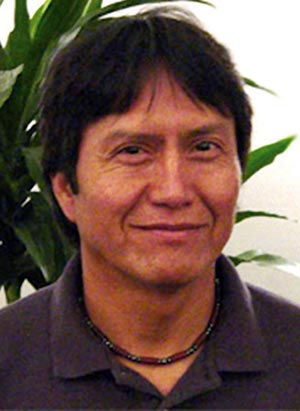New NIEA board member lays out priorities
By Erny Zah
Navajo Times
WINDOW ROCK, Nov. 17, 2011

Timothy Begaye
Timothy Begaye, 51, was elected to the National Indian Education Association. Begaye, who is a consultant with the Department of Diné Education, was elected to a three-year term at NIEA's 42nd annual convention held Oct. 26-30.
He is originally from Hard Rock, Ariz.
"I wanted to get myself involved in the national issues," he said, explaining why he ran for the board.
He has been working in the education field for more than two decades.
Begaye said as a member of the national board, he wants to have input about how Bureau of Indian Education schools are run.
Begaye said though he is Navajo, his outlook as a board member will broaden to include the needs of other tribes as well.
"A lot of the work is not Navajo specific," he said. "I have to think of all the tribes in terms of funding and in terms of policy."
Begaye has experience as a teacher, administrator and has served on the editorial board for the Harvard Educational Review, as a member of the Harvard Evaluation and Research Team for the Annenberg Foundation, and on the board of directors for the North American Indian Center of Boston, according to his personal statement.
He earned his doctorial degree from Harvard University along with a master's degrees in education and education administration.
One of the upcoming issues for the NIEA board is congressional reauthorization of the No Child Left Behind Act.
Begaye said he hopes NIEA can make headway on allowing Native language and culture to be a component within the act.
Another piece of legislation NIEA is focusing on is the Native CLASS Act, a piece of legislation developed by the NIEA, said Mary Jane Oatman, former NIEA board president.
According to the NIEA Web site, this legislation would recreate a federal director of Indian education and would make student data available to tribal agencies.
The Department of Diné Education has been meeting with education officials for the past few months in an attempt to convince state agencies to allow DODE to review student information. States won't release that information because of the Family Education Rights and Privacy Act.
DODE has said that knowing the academic performance of Navajo students would allow it to create and advocate for curriculum that would improve performance.
The Native CLASS Act would amend the law to allow tribal educational agencies to have access to student information.
Newly elected NIEA Board President Quinton Roman Nose said the Senate Indian Affairs Committee recently reviewed the Native CLASS Act.
He added that NIEA hopes to create awareness about some of its proposals when tribal leaders gather in Washington, D.C., for the White House Tribal Nations Conference scheduled for the beginning of December. The NIEA is scheduled to host a reception.
Begaye added that the upcoming U.S. election year is an opportunity for NIEA to educate candidates about its ideas for Indian education, which he hopes to do.
"If I can do some work at the national level, I'll be able to influence some of our schools," he said.
Back to top ^
